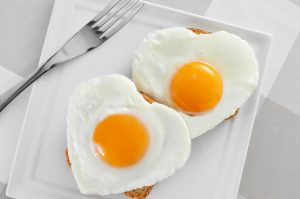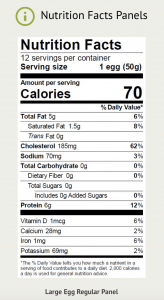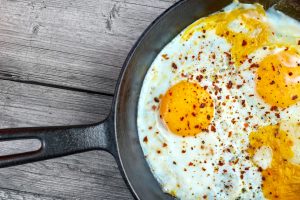Can I Eat Eggs and Lose Weight?
Successful weight loss is as simple as making good decisions for your breakfast. Adding eggs to your diet may be one of the easiest things to do if you’re trying to lose weight. Eggs are cheap, easy to make, and they are a great source of protein and many other nutrients. There are plenty of studies looking at eggs and weight loss. We will look at a few of them.
- Eggs are a great way to start your day. A breakfast containing eggs will reduce the number of calories you eat for the rest of the day. They not only reduce calorie intake for the rest of the day, they also reduce them for up to 36 hours. In the study, the test group that ate eggs ended up eating fewer calories at lunch, the rest of the day, and for the next 36 hours. The first study I want to look at reviews the short-term effect of eggs on satiety in overweight and obese subjects. They reviewed 30 overweight or obese women who ate either bagels or eggs for breakfast [1]. Simply, eating eggs was so fulfilling that the subjects automatically ate fewer calories at subsequent meals. Although this study was on women, I suspect that this is not a gender effect so the same should be true with men.
- Eggs make you feel full. Eggs are high in protein and meals high in protein have been shown to induce satiety[2],[3]. One study, in particular, showed that meals with 30-39 grams of protein including eggs not only reduced hunger and calorie intake but also resulted in better post-meal blood sugars[4]. Multiple other studies have confirmed that eggs control hunger better and reduce calorie intakes for the rest of the day[5],[6],[7],[8],[9],[10].
- Eggs will assist in reducing body fat. Adding eggs will not only assist in increasing satiety and reduce calorie intake. Eggs have also been shown to help reduce body fat. One study found that adding eggs assisted subjects in losing 16% of their body fat[11]. Other studies show that high-quality protein, such as eggs, assist in weight loss more than carbohydrates[12].
- Eggs help with weight loss better than complex carbohydrates. In another study, The researchers looked at 152 overweight men and women who were split into two groups. One group ate eggs for breakfast, the other ate bagels for breakfast. Both groups were on a calorie-controlled diet[13]. After 8 weeks, the egg group had lost significantly more weight than the bagel group. The egg group lost 65% more weight loss, 61% reduction in BMI, 34% reduction in waist circumference, and a 16% loss in body fat. This makes perfect sense sone bagels are high in carbohydrates and will result in high insulin and elevations in cortisol which promotes belly fat.
- Eggs will not significantly increase cholesterol. In the past, many physicians recommended against egg consumption because of the risk of high cholesterol. Many of the studies that supported this recommendation also had high trans fats but more recent studies have shown that eggs do not increase bad (LDL) cholesterol[14],[15],[16]. There are many studies that show eggs do not raise LDL cholesterol and there is no clear tie to heart disease.
- Eggs are low carb and low calorie. Eggs have only a little under 80 calories per egg and they fish in protein. The protein in eggs is very bioavailable. Eggs not only have protein but also are high in zinc, iron and vitamins A, D, E, and B12. Even three eggs contain less than 240 calories as long you don’t cook them in lard.
- Eggs may increase your metabolism. Eggs are high in protein and protein takes increased energy to utilize them to make the other proteins and to utilize for energy[17],[18]. This may be explained by an increased thermic effect during the digestion and utilization of protein over carbohydrates and fats[19],[20]. Basically, a higher protein diet such as one containing eggs may increase the calories you burn just be the food choices you make.
Summation: Calories count, but that is not the whole story. The right kind of calories is important. Protein, healthy fats, and plenty of fiber, which is the cornerstone of the Atkins diet, can make a major difference in the success of your endeavor to lose weight. Eggs in particular seem to promote satiety and should be in any diet you are trying.
Recommendations:
- Eggs are filling.
- Eggs are dense in nutrients.
- Eggs may boost your metabolism.
- Eggs are a great source of protein.
- Eggs are high in choline which may promote liver and brain health.
- Eggs are naturally low carb.
The bottom line: Eggs can make you feel more full, burn more calories, and help you eat fewer calories throughout the day. Eggs are not essential, but you will be more likely to be successful if you add them to your diet.
References:
-
Alexander, DD, PE Miller, AJ Vargas, DL Weed, and SS Cohen. “Meta-Analysis of Egg Consumption and Risk of Coronary Heart Disease and Stroke.” Journal of the American College of Nutrition, October 6, 2016, 1–13 [PubMed]
-
Crovetti, R, M Porrini, A Santangelo, and G Testolin. “The Influence of Thermic Effect of Food on Satiety.” European Journal of Clinical Nutrition 52, no. 7 (July 1, 1998): 482–88 [PubMed]
-
Fallaize, R, L Wilson, J Gray, LM Morgan, and BA Griffin. “Variation in the Effects of Three Different Breakfast Meals on Subjective Satiety and Subsequent Intake of Energy at Lunch and Evening Meal.” European Journal of Nutrition 52, no. 4 (June 1, 2013): 1353–59 [PubMed]
-
Johnston, CS, CS Day, and PD Swan. “Postprandial Thermogenesis Is Increased 100% on a High-Protein, Low-Fat Diet versus a High-Carbohydrate, Low-Fat Diet in Healthy, Young Women.” Journal of the American College of Nutrition 21, no. 1 (February 1, 2002): 55–61 [PubMed]
-
Leidy, HJ, HA Hoertel, SM Douglas, KA Higgins, and RS Shafer. “A High-Protein Breakfast Prevents Body Fat Gain, through Reductions in Daily Intake and Hunger, in ‘Breakfast Skipping’ adolescents.” Obesity (Silver Spring, Md.) 23, no. 9 (September 1, 2015): 1761–64 [PubMed]
-
Leidy, HJ, M Tang, CL Armstrong, CB Martin, and WW Campbell. “The Effects of Consuming Frequent, Higher Protein Meals on Appetite and Satiety during Weight Loss in Overweight/Obese Men.” Obesity (Silver Spring, Md.) 19, no. 4 (April 1, 2011): 818–24 [PubMed]
-
Mutungi, G, D Waters, J Ratliff, M Puglisi, RM Clark, JS Volek, and ML Fernandez. “Eggs Distinctly Modulate Plasma Carotenoid and Lipoprotein Subclasses in Adult Men Following a Carbohydrate-Restricted Diet.” The Journal of Nutritional Biochemistry 21, no. 4 (April 1, 2010): 261–67 [PubMed]
-
Paddon-Jones, D, E Westman, RD Mattes, RR Wolfe, A Astrup, and M Westerterp-Plantenga. “Protein, Weight Management, and Satiety.” The American Journal of Clinical Nutrition 87, no. 5 (May 1, 2008): 1558S–1561S [PubMed]
-
Rains, TM, HJ Leidy, KD Sanoshy, AL Lawless, and KC Maki. “A Randomized, Controlled, Crossover Trial to Assess the Acute Appetitive and Metabolic Effects of Sausage and Egg-Based Convenience Breakfast Meals in Overweight Premenopausal Women.” Nutrition Journal 14 (February 10, 2015): 17 [PubMed]
-
Ratliff, J, JO Leite, Ogburn de, MJ Puglisi, J VanHeest, and ML Fernandez. “Consuming Eggs for Breakfast Influences Plasma Glucose and Ghrelin, While Reducing Energy Intake during the next 24 Hours in Adult Men.” Nutrition Research (New York, N.Y.) 30, no. 2 (February 1, 2010): 96–103 [PubMed]
-
Rong, Y, L Chen, T Zhu, Y Song, M Yu, Z Shan, A Sands, FB Hu, and L Liu. “Egg Consumption and Risk of Coronary Heart Disease and Stroke: Dose-Response Meta-Analysis of Prospective Cohort Studies.” BMJ (Clinical Research Ed.) 346 (January 7, 2013): e8539 [PubMed]
-
Tentolouris, N, S Pavlatos, A Kokkinos, D Perrea, S Pagoni, and N Katsilambros. “Diet-Induced Thermogenesis and Substrate Oxidation Are Not Different between Lean and Obese Women after Two Different Isocaloric Meals, One Rich in Protein and One Rich in Fat.” Metabolism: Clinical and Experimental 57, no. 3 (March 1, 2008): 313–20 [PubMed]
-
Vander, Wal, A Gupta, P Khosla, and NV Dhurandhar. “Egg Breakfast Enhances Weight Loss.” International Journal of Obesity (2005) 32, no. 10 (October 1, 2008): 1545–51 [PubMed]
-
Vander, Wal, JM Marth, P Khosla, KL Jen, and NV Dhurandhar. “Short-Term Effect of Eggs on Satiety in Overweight and Obese Subjects.” Journal of the American College of Nutrition 24, no. 6 (December 1, 2005): 510–15 [PubMed]
-
Weigle, DS, PA Breen, CC Matthys, HS Callahan, KE Meeuws, VR Burden, and JQ Purnell. “A High-Protein Diet Induces Sustained Reductions in Appetite, Ad Libitum Caloric Intake, and Body Weight despite Compensatory Changes in Diurnal Plasma Leptin and Ghrelin Concentrations.” The American Journal of Clinical Nutrition 82, no. 1 (July 1, 2005): 41–48 [PubMed]
-
Westerterp-Plantenga, MS. “Protein Intake and Energy Balance.” Regulatory Peptides 149, no. 1–3 (August 7, 2008): 67–69 [PubMed]
-
———. “The Significance of Protein in Food Intake and Body Weight Regulation.” Current Opinion in Clinical Nutrition and Metabolic Care 6, no. 6 (November 1, 2003): 635–38 [PubMed]












Leave a Reply